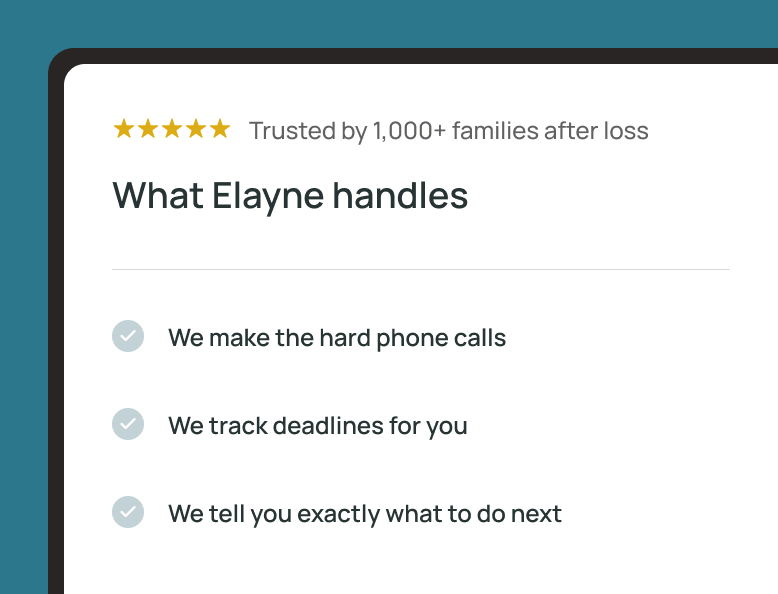Key Takeaways
- Focus first on urgent tasks like notifying authorities and securing property.
- Emotional support and space to grieve are just as important as logistics.
- Step-by-step guidance can help you manage legal, financial, and family responsibilities.
{{blog-cta-admin}}
Losing a father is a life-altering experience. Whether his death was expected or sudden, the pain and confusion in the early hours and days can feel overwhelming. In the midst of shock and sorrow, you may be faced with immediate decisions and responsibilities that you don’t feel ready to make.
If you’re searching “My dad just died, what now?”, know that you are not alone. This guide provides practical, step-by-step support, helping you move through the most urgent tasks while reminding you to take care of yourself along the way.
What to Do Immediately After Death
If your father passed away at home and was not under hospice care, call 911 to report the death. Emergency services will guide you through the next steps and may transport him to a hospital where a doctor can issue a legal pronouncement of death. If he was in hospice, a nurse can handle this step for you.
The legal pronouncement of death is required to obtain the death certificate, which you’ll need for nearly every administrative task that follows.
Next, notify close family members. This can be an emotional and difficult step, but it also opens the door for shared grief and collective planning. You don’t have to do everything alone.
Secure Property and Personal Belongings
After death, it’s important to protect your father’s property:
- Lock the home, vehicles, and any storage units.
- Secure valuables such as IDs, keys, financial records, and legal documents.
- If he had pets, plants, or dependents, make immediate arrangements for their care.
Do not begin cleaning out or distributing belongings until you’ve reviewed the legal situation. If there’s a will or trust, it may include specific instructions. Even if there isn’t, there are legal steps to follow to avoid complications.
Choose a Funeral Home and Begin Arrangements
One of the next steps is selecting a funeral home. You'll need to decide between burial and cremation and begin planning the service. Before making decisions:
- Check if your dad had prepaid funeral arrangements, a written plan, or expressed wishes.
- If no plan exists, request quotes from a few local providers to understand your options.
- Ask for a price list upfront to avoid unexpected costs.
Planning a funeral can feel daunting. Lean on family and friends for support during this process.
Gather Important Documents
Documentation is critical for settling an estate and handling legal and financial matters. Start collecting the following:
- Will or trust documents
- Life insurance policies
- Bank and financial account information
- Social Security number and birth certificate
- Marriage certificate, military discharge papers (if applicable)
- Titles to property and vehicles
You’ll also need 5–10 certified copies of the death certificate. These are often required to notify banks, insurers, and government agencies. If no will exists, you’ll need to begin learning about intestate succession, the legal process for distributing assets when someone dies without a will.
Notify Relevant Institutions
Once the death certificate is issued, notify these organizations:
- Social Security Administration (especially if your dad was receiving benefits)
- Banks and investment firms
- Life insurance companies
- Employer or pension administrator
- Utility companies, phone/internet providers, subscription services
- DMV and voter registration (requirements vary by state)
Cancel or transfer accounts as needed to avoid unnecessary fees or fraud.
Start the Estate and Probate Process
Settling your father’s estate is one of the more complex steps.
- If he had a will, locate it and identify the named executor.
- The executor must file the will with the local probate court to begin the legal process.
- If there’s no will, a family member or representative must petition the court to appoint an administrator.
Probate involves validating the will, settling debts, and distributing assets. Depending on the estate’s complexity, consider hiring an estate attorney to assist.
If you're managing your father’s estate on top of grief, Elayne offers post-loss estate management automation to help you settle estates with ease.
Take Care of Yourself and Your Family
Amid the to-do list, don’t forget this: You are grieving. It’s okay to cry, to be numb, to feel overwhelmed—or all of these at once. Prioritize emotional care alongside logistics.
- Talk with siblings, friends, clergy, or a therapist.
- Accept help—meals, rides, childcare—from those who offer.
- Take breaks. Rest. Eat. Give yourself permission to move slowly.
Grief doesn’t follow a schedule, and there’s no “right” way to mourn. One step at a time is enough.
{{blog-cta-admin}}
FAQs
Q: Do I need to call the police if my dad dies at home?
A: If he wasn’t in hospice care, yes—call 911. They’ll help initiate the legal process.
Q: What documents do I need to find first?
A: The will or trust, insurance policies, Social Security number, and financial records are top priorities.
Q: Can I plan the funeral before I get the death certificate?
A: Yes, but you’ll need the certificate to finalize burial or cremation and to begin closing accounts.
Q: What if my dad didn’t have a will?
A: The estate will go through intestate probate, and the court will determine who inherits what based on state laws.
Q: How do I handle my dad’s digital accounts or phone?
A: Secure his devices and change passwords if possible. Contact each platform for account closure or memorialization.
There’s no perfect roadmap for losing a parent, but there is support. By focusing on one task at a time and leaning on trusted resources, you can honor your father’s memory while caring for yourself and your family.
Grief and logistics don’t follow a schedule, but you don’t have to navigate them alone.
Elayne’s automated estate settlement platform provides clear, compassionate tools for families handling loss. Let us help with settling estates so you can focus on healing.












































